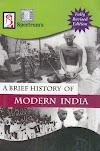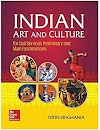Indian National Movements and Rise of Nationalism
"Nationalism is an when countries had extreme pride in Nation"
Factors favouring the rise of Nationalism
1. Collision of interests
- Many classes of Indian society like intelligentsia, capitalist, farmers, labourers, artisans, etc. considered the very presence of British detrimental to them (as British always favoured their own interest at the expense of others/natives).
2. Political and administrative unification of India
- To serve their imperial interests British unified India politically, administratively and economically.
- It also led to unification of grievances in the different parts of the country and people started to identify Britishers as their common enemy.
3. Development of modern means of transport and communication
Contributions of Lord Dalhousie
- Railways
- Telegraph services
- Re-organisation of post offices
That's why Dalhousie is also known as 'The maker of modern infrastructure in India'.
- By 1900, 25000 miles of railway lines were laid down by the British.
- Edwin Arnold prophesized in 1865, "Railways may do for India what dynasties have never done, what the genius of Akbar could not affect by the governance, not the cruelty of Tipu Sultan; Railways have made India a nation".
- Introduction of postal and electric telegraph system enabled national literature to circulate more widely to the other parts of the country.
- It also led to the dissemination of ideas and common grievances among different parts of the country.
4. Education
- The inaugural of English education proved to be momentous in the rise and growth of nationalism.
- Ideas of Bentham, J.S. Mill, Spencer, John Locke, Rousseau, Montesquieu, Voltaire, etc inspired the newly educated class of Indian intelligentsia with the ideas of liberty, equality, nation, self-governance, etc.
- Some of the Indian people who had the first hand experience of working in Britain found that the condition in India was slavish.
- After coming to India, they started to demand basic rights for Indians.
5. Role of Press and Vernacular literature
- First printing press was established by James Augustus Hicky which led to establishment of vernacular press in India in the later half of the 19th century.
- There was a huge growth in vernacular literature which includes -
- Indian Mirror
- Bengalee
- Amrita Bazar patrika (AVP)
- Keshari
- Maharatta
- Indu Prakash
- The Hindu
- These newspaper and literatures exposed the exploitative character of the Britishers.
First Printing Press Newspaper - Bengal Gazette (1780) by James Augustus Hicky.
6. Emergence of the new middle class
- They came from varied background, regions and religions.
- After mastering English language, they raised questions regarding orthodox practices and customs.
- They emphasised on introspection and tried to forge an all India identity.
7. Impact of revolutionary activities abroad
- A number of nation states came to picture in South America on the ruins of Spanish and Portuguese empire.
- Educated Indians were inspired by this.
8. Rediscovery of India's past and cultural nationalism
- A degree of self respect and confidence was brought about by historical research and excavation. For example - Indus Valley Civilisation
- Philosophical and literary merits of Vedas and Upanishads further boosted the morale of the Indians and inspired them with the new spirit of cultural nationalism.
9. Policy of Racial discrimination
- Britishers perpetuated racial myth of White Superiority.
- They followed a deliberate policy of stamping out Indians from the process of administration.
- For example - The maximum age of ICS was reduced to 19 years from 21 years.
10. Ilbert bill controversy (1893)
Lord Ripon - known as the "Father of Indian Decentralisation" & "Father of Local Self-Governance".
- Lord Ripon attempted to pass Ilbert bill which sought to abolish Judicial disqualification based on race distinction.
- It tried to give Indian members of the covenanted civil services same power and rights as those enjoyed by European counterparts.
- But in the face of stiff opposition, bill was modified, which made it clear to the nationalist that justice and fair play could not be expected where the interest of European community was involved and at the same time it teaches the nationalist the power of masses and collective opposition.
11. Economic critique of the Colonialism
- The high priest of economic critique was Dada Bhai Naoroji (who gave Drain of Wealth theory).
- Other important leaders included Justice Mahadev Govind Ranade, R.C. Dutta, G. Subramaniya Iyer, P.C. Ray, G.V. Joshi and Gopal Krishna Gokhale who analysed every aspect of Indian economy.
- These leaders explained Colonial structure in all the three aspects of economy, i.e., TIF (Trade, Industry and Finance) detrimental to India.
- Trade - There was one way free trade for the British while Indian producers who can still compete were charged with heavy duty, thus making it uncompetitive for Indians.
- Industry - India was made a place of raw material supplier to the British industries and a consumer market for the finished goods produced. This led to the promotion of cash crops and commercialisation of agriculture in India.
- Finance - The development of railways led to the arrival of heavy foreign capital which created vested interest and they demanded security for investment which further perpetuated foreign rule.
Theory of Drain of Wealth
Dada Bhai Naoroji in 1867 put forwarded the idea that Britain was draining and bleeding India (in Poverty and Un-British rule in India).
John Sullivan, president of Board of Revenue, Madras added, "Our system acts like a sponge, drawing up all the good things from the banks of Ganges (Ganga) and squeezing them down on the banks of Thames".
Early nationalists declared that, the drain was basic cause of India's poverty and the fundamental evil of the British rule in India.
Components of Drain
- Remittances to Britain
- Home charges of the Government of India which is basically expense of Indian Government in Britain.
- Excess of export over import for which India got no benefit.
Huge export of Raw Materials which led to exploitation of resources and at the same time undermine the earning of Indians as raw materials are sold at cheaper rates.
According to the nationalists calculations, this drain amounted to 1/2 of the government revenue. more than the entire land revenue and over 1/3rd of India's total savings.
The drain theory possessed the great political merit of being easily grasped by a nation of peasants. No idea could arise people more than the thought that they were being taxed so that people in far lands might live in comfort.
Previous Article - Socio Religious Reform Movement (Sikhism and Parsi)
Next Article - Early Political Organisations
Notes on other subjects
Optional Subject
Note - This is my Vision IAS Notes (Vision IAS Class Notes) and Ashutosh Pandey Sir's Public Administration Class notes. I've also added some of the information on my own.
Hope! It will help you to achieve your dream of getting selected in Civil Services Examination 👍





0 Comments